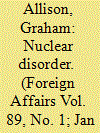| Srl | Item |
| 1 |
ID:
094473


|
|
|
|
|
| Publication |
2010.
|
| Summary/Abstract |
The global nuclear order today could be as fragile as the global financial order was two years ago, when conventional wisdom declared it to be sound, stable, and resilient. In the aftermath of the 1962 Cuban missile crisis, a confrontation that he thought had one chance in three of ending in nuclear war, U.S. President John F. Kennedy concluded that the nuclear order of the time posed unacceptable risks to mankind. "I see the possibility in the 1970s of the president of the United States having to face a world in which 15 or 20 or 25 nations may have these weapons," he forecast. "I regard that as the greatest possible danger." Kennedy's estimate reflected the general expectation that as nations acquired the advanced technological capability to build nuclear weapons, they would do so. Although history did not proceed along that trajectory, Kennedy's warning helped awaken the world to the intolerable dangers of unconstrained nuclear proliferation.
|
|
|
|
|
|
|
|
|
|
|
|
|
|
|
|
| 2 |
ID:
094078


|
|
|
|
|
| Publication |
2010.
|
| Summary/Abstract |
In 1963, President John F. Kennedy called the President's Foreign Intelligence Advisory Board (PFIAB) the most useful of all of his advisory panels.1 In his first year of office, the Board met more than twice a month on average, more often than in its entire history up to that date. One of its primary tasks under Kennedy was to recommend the reorganization of the many defense intelligence elements.2 The organization of intelligence, the incorporation of technology, the Soviet threat, and political and intelligence scandals have occupied the PFIAB for most of its history. The study of such issues is performed at the direction of the President, and thus reflects his priorities and needs, as well as his opinion of the usefulness of this Board of advisors.
|
|
|
|
|
|
|
|
|
|
|
|
|
|
|
|